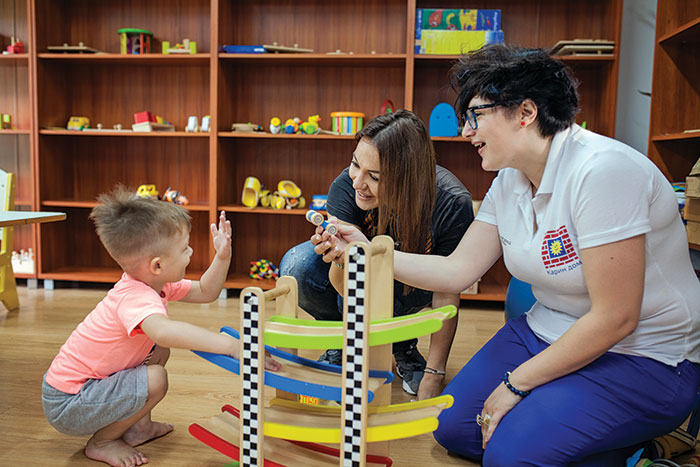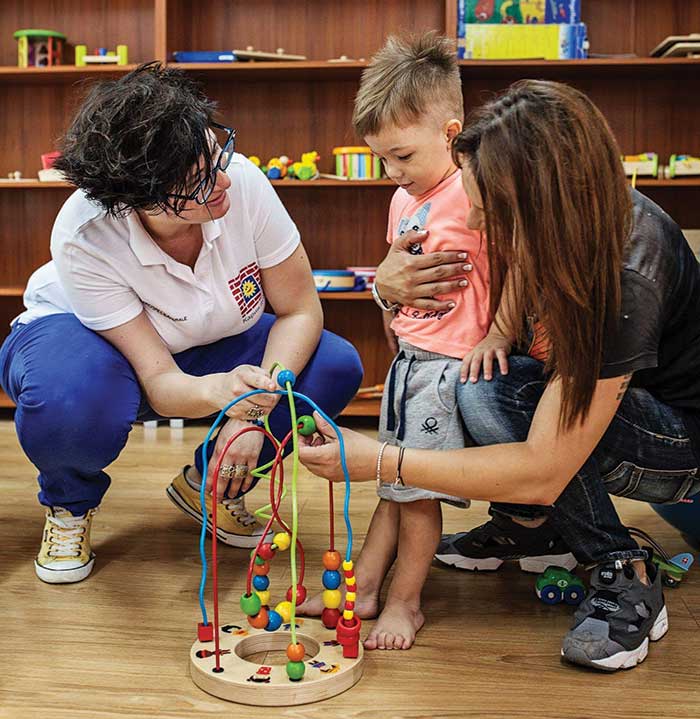Every time I think about a child, I think about the family too because I see them as a whole. As part of this whole, the child goes through different stages throughout the years, with their parents supporting the transition from one environment to another. This is a complex process that depends on various parties, but in early childhood it depends mainly on parents and caregivers. Moreover, when there is a child with special needs, the support needs present a bigger challenge. One of the successful ways to support families at this early stage is through family-mediated intervention.
What is family-mediated intervention?
This type of support was developed at Karin Dom Foundation in Bulgaria in our Centre for Family-Mediated Intervention. Here, three groups were set up to support families and their children (aged 2 to 6) with developmental concerns. The groups help parents cope with the difficulties they face in their daily lives and also prepare children for a smooth transition into inclusive education.

Our activities
In the three groups, we train parents and extended family members, carers and assistants in various strategies that teach children about:
- everyday skills;
- understanding the meaning of communication and enjoying interaction with others;
- the pursuit of autonomy;
- the desire to gain new knowledge.
We visit the nurseries and kindergartens where the children are enrolled and help with building an inclusive environment for all children. We advise about use of appropriate materials and about improving communication and understanding between children and between parents and teachers to ensure continuity of the work.
Each family-mediated intervention group includes between 4 and 7 families and is run by speech therapists or psychologists who train parents but avoid working directly with children. Group sessions take place twice a week for two hours. We have formed three groups according to the needs of the children:
- one group is for children with difficulties in functional communication and adaptive skills;
- one is for children from the autistic spectrum;
- one is for children with complex and intensive support needs.
There are various activities in the groups but they all stimulate communication between children and also between parents as well as the involvement of children in various games and activities. The activities prepare children for the educational process, for following the rules and routines in the kindergarten, and also help with cognitive development.
Over time, working in a group with other parents but having individual support plans and receiving home visits, parents get to know their children better. They learn to understand them and share more easily and openly, thus becoming better advocates for their children. They have a realistic view of their child and his or her needs, and support their inclusion in kindergarten and school.

There is no greater power than the one of the family. We believe that learning, trust and empowerment, giving a hand and making steps together will provide a successful start for the child into the educational environment. The parents we work with are confident. They know how to help their children, they have learned how to deal with different challenges and how to teach their children a love of communication, and an interest in knowledge and learning. Finally and most importantly, they are proud of their children, of their achievements, and they easily understand and support the educational process.
Contact
Nikoleta Yoncheva is a speech therapist and trainer at Karin Dom Foundation, Bulgaria.
